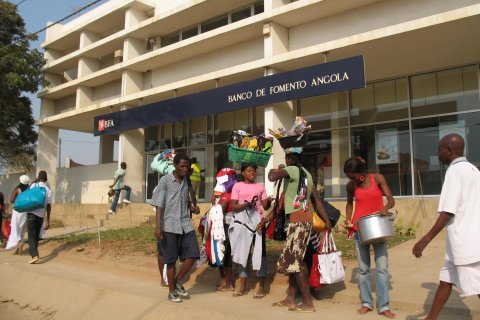"The outlook for the evolution of Angola's economy is positive and the trigger for an eventual rise in the 'rating' will be the resilience and confidence that the Government will maintain the momentum in reforms even when prices fall", said the director of Fitch Ratings for Africa and the Middle East.
At a virtual conference on the evolution of African economies, Toby Iles said that "the budgetary, monetary and economic reforms that were successfully carried out, and the price of oil have been the key to economic recovery, helped to pay the debt and contributed to a very significant appreciation of the kwanza".
Responding to questions from Lusa about Fitch Ratings' opinion regarding Angola's financial situation, the analyst added that "more evidence is needed on the ability to maintain external liquidity, because reserves have not risen much with high oil prices" , which are the main contributor to international foreign currency reserves.
In January, Fitch Ratings improved the outlook for Angola's rating to positive, maintaining its opinion on sovereign credit quality at B-, below the investment recommendation.
"The prospect of positive evolution reflects the recent sharp drop in public debt, large current account surpluses and lower financing risks, supported by a more favorable oil environment", reads the note that accompanied, in January, the decision to maintain the 'rating' at B-, two levels below the investment recommendation, that is, 'junk', or 'junk', as it is generally referred to.
Fitch Ratings, owned by the same owners of the consultancy Fitch Solutions, analyzes 22 countries in Africa, 19 of which are in sub-Saharan Africa, and of these, almost half, 45 percent, have a 'rating' of CCC or are in financial default, which which highlights the "significant levels of credit risk in the region".
At the conference, analysts pointed out that despite 2023 not being a very heavy year in terms of sovereign debt maturity, the next two years will be difficult for a good part of the countries, which face the end of the loan term, and will therefore have to repay the entirety of what they borrowed or issued in the international financial markets.
"In 2024 there will be more financial pressure on countries, with Kenya, Egypt and Ethiopia having to pay more than US$2 billion each, and 2025 will be even more difficult, with several countries facing debt maturity", he warned. the analyst.
Asked about how African countries are dealing with the rise in interest rates and the impacts of rising oil prices and inflation, particularly food prices, Toby Iles highlighted the importance of fiscal consolidation.
"Fiscal consolidation is crucial, they are trying to unlock the mechanisms that allow increasing domestic revenue mobilization, which is very difficult historically, and they are more focused on managing public finances, while trying to maintain and even accelerate growth. economy," he said, stressing that "the other option is restructuring" of the debt.
External debt payments of the poorest countries, including all African Portuguese speakers, will rise to the highest since 1998, representing 16.3 percent of total revenues, more than doubling since 2011.
"Foreign debt payments from 91 countries will average 16.3 percent of tax revenue this year, rising to 16.7 percent in 2024, a 150 percent increase since 2011," according to an analysis note from the non-governmental organization (NGO) Debt Justice, dedicated to sustainable debt issues, from April.







